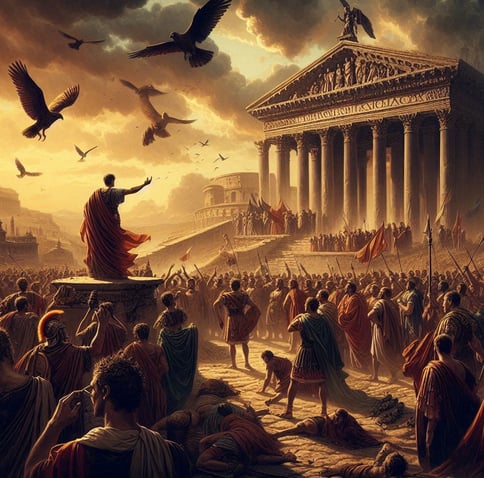The Real Story of Julius Caesar: From Ambitious Youth to Ides of March
From his humble beginnings in Suburra to his dramatic assassination on the Ides of March, Julius Caesar’s life was a whirlwind of ambition, power, and betrayal. This blog explores the real story behind the man who conquered Gaul, crossed the Rubicon, and reshaped Rome forever. Discover the triumphs, reforms, and controversies that made Caesar a legend—and the conspiracy that ended his life.
WiserFool
The Real Story of Julius Caesar: From Ambitious Youth to Ides of March
Julius Caesar (100–44 BCE) was a military genius, political mastermind, and charismatic leader whose life reshaped the ancient world. From his meteoric rise to power to his brutal assassination, his story is a tapestry of ambition, innovation, and betrayal. This blog unravels the real history behind the man who destroyed the Roman Republic—and laid the foundation for the Roman Empire.
1. Early Life: The Spark of Ambition (100–70 BCE)
Birth and Noble Lineage
Born: July 12 or 13, 100 BCE, in Suburra, a working-class district of Rome.
Family: The Julii claimed descent from Venus and Aeneas, but by Caesar’s time, they were politically marginal. His father, Gaius Julius Caesar, died when he was 16, leaving his mother, Aurelia Cotta, to steer his education.
Education and Early Struggles
Caesar studied rhetoric, philosophy, and military strategy. His tutor, Marcus Antonius Gnipho, honed his oratory skills.
At 17, he married Cornelia, daughter of Lucius Cinna, a rival of the dictator Sulla. When Sulla ordered Caesar to divorce her, he refused, fleeing Rome until Sulla’s death in 78 BCE.
First Military Service
Caesar served in Asia Minor (modern Turkey) under Marcus Thermus, earning the Civic Crown for bravery at the Siege of Mytilene (80 BCE).
Kidnapped by pirates in 75 BCE, he reportedly joked about crucifying them—and did so after his ransom was paid.
2. Climbing the Cursus Honorum: The Path to Power (69–60 BCE)
Political Beginnings
Quaestor (69 BCE): Managed finances in Hispania (Spain), where he wept before a statue of Alexander the Great, lamenting his own lack of achievements at 32.
Aedile (65 BCE): Funded lavish games and public works, bankrupting himself to win popularity.
Pontifex Maximus (63 BCE): Elected Rome’s chief priest, solidifying his religious and political influence.
The First Triumvirate: Alliance of Power
In 60 BCE, Caesar formed a secret pact with Pompey the Great (Rome’s top general) and Crassus (its richest man). This First Triumvirate bypassed the Senate to dominate Roman politics.
Consulship (59 BCE): As consul, Caesar pushed through land reforms for veterans, alienating the Senate but endearing him to the people.
3. Conquest of Gaul: The Making of a Legend (58–50 BCE)
The Gallic Wars
As governor of Gaul (modern France), Caesar conquered the region in a brutal eight-year campaign, documented in his Commentarii de Bello Gallico.
Key Battles:
Battle of Alesia (52 BCE): Defeated Gallic chieftain Vercingetorix, showcasing his siege tactics.
Invasion of Britain (55–54 BCE): A propaganda triumph, though militarily inconsequential.
Political Fallout
The Senate, fearing his power, ordered him to disband his army. Caesar famously crossed the Rubicon River in 49 BCE, declaring “Alea iacta est” (“The die is cast”), sparking civil war.
4. Civil War and Dictatorship (49–44 BCE)
Defeating Pompey
Caesar pursued Pompey to Greece, crushing his forces at the Battle of Pharsalus (48 BCE). Pompey fled to Egypt, where he was assassinated by Ptolemy XIII.
Egyptian Interlude: Caesar allied with Cleopatra VII, who bore him a son, Caesarion.
Reforms as Dictator
Calendar Reform: Introduced the Julian calendar (basis of the modern Gregorian calendar).
Social Policies: Granted citizenship to provinces, redistributed land to the poor, and reduced debts.
Centralized Power: Appointed himself dictator perpetuo (“dictator for life”), eroding Republican traditions.
5. The Ides of March: Conspiracy and Assassination (44 BCE)
Growing Resentment
Senators feared Caesar’s monarchical ambitions. Rumors swirled that he planned to declare himself king.
Key Conspirators: Brutus (his protégé) and Cassius, motivated by Republican idealism and personal grievance.
The Assassination
On March 15, 44 BCE, Caesar was stabbed 23 times in the Senate. According to Suetonius, his last words were “You too, my child?” (to Brutus), though Shakespeare’s “Et tu, Brute?” is more famous.
Aftermath: Chaos ensued. Caesar’s death triggered a 13-year power struggle, culminating in the rise of his heir, Octavian (Augustus), as Rome’s first emperor.
6. Legacy: The Man Who Became a God
Political Impact: His death marked the end of the Republic and the birth of imperial rule.
Cultural Legacy: Deified as Divus Julius in 42 BCE. His name became a title (Caesar/Kaiser/Tsar) symbolizing power.
Historical Debate: Was he a visionary reformer or a power-hungry tyrant? Modern scholars argue both.
Conclusion: The Paradox of Caesar
Julius Caesar was a man of contradictions: a populist who destroyed democracy, a conqueror who brought stability, and a mortal who became a god. His life reminds us that history is shaped not just by ideals, but by ambition—and that no one is immune to the knives of those they trust.


